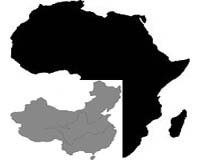 |
Riyadh, Saudi Arabia (UPI) Mar 25, 2009 The roundup of more than 100 al-Qaida suspects allegedly planning attacks on Saudi Arabia's oil installations heightened concerns that battering the global energy industry remains a high strategic priority for the jihadists. Wednesday's announcement of the counter-insurgency operation carried out in the kingdom, the world's leading oil producer, over recent months came hard on the heels of a U.S. Navy warning Monday that al-Qaida was planning possible suicide attacks on ships off Yemen in the Red Sea, the Bab al-Mandeb Strait and the Gulf of Aden. In earlier indications of a new jihadist offensive against the energy sector, Singapore's navy warned March 3 that terrorists planned to attack oil tankers in the choke point Strait of Malacca between Malaysia and the Indonesian island of Sumatra. The 600-mile waterway, the shortest route between the Persian Gulf and the Pacific, is a vital energy corridor to Asia, particularly energy-hungry China. In early February, Said al-Shihri, deputy leader of al-Qaida in the Arabian Peninsula, the jihadist group based in Yemen, called on jihadists in Somalia, across the Gulf of Aden, to join his fighters and take control of the Bab al-Mandeb Strait. That waterway, north of the pirate-infested Gulf of Aden, links the Red Sea and the Indian Ocean. The Saudi announcement that 113 suspected jihadists, all but three of them Saudis or Yemenis, were arrested in several security sweeps over five months underlined that AQAP is determined to relaunch major operations against the Saudi monarchy after the jihadist campaign in the kingdom was crushed in 2006. The Saudis said at least two suicide teams of six men each had been formed in Yemen, which has become a major al-Qaida base since the Saudi and Yemeni jihadists joined forces in late 2008. Riyadh didn't identify the installations it said the jihadists were targeting. But they are likely to include major terminals and refineries in the kingdom's Gulf-side Eastern province, the center of its oil industry, and on the Red Sea coast. The Gulf coast sites include the vast Ras Tanura complex. This includes the world's largest oil terminal, which transfers 5 million barrels per day, around 6 percent of all the oil consumed daily around the globe. One U.S. energy expert said Ras Tanura "is the single most important facility in the oil industry." It was believed to have been the target of a 10-man al-Qaida cell that included men who worked for the state oil company, Aramco, which was broken up in Saudi security in October 2003. Also on the Gulf coast is Abqaiq, the largest oil processing facility and the largest crude stabilization plant in the world. It handles around two-thirds of Saudi Arabia's crude output. Al-Qaida made an abortive attack on the facility on Feb. 24, 2004. On May 1 that year, gunmen attacked the kingdom's western oil hub at Yanbu on the Red Sea, killing six Western expatriates at a complex jointly run by the Saudi petrochemical firm Sabic and Exxon Mobil. Yanbu is a key export terminal for Saudi crude bound for North America and Europe. Four weeks later, on May 29, jihadists stormed a complex in Khobar, near the oil center of Dhahran on the Gulf coast. Twenty-two people, including 19 expatriates, were killed. The objective in these two attacks was to drive away foreign personnel who help operate the Saudi oil and gas industry. There are an estimated 25,000 foreigners, mainly Americans, Canadians and Europeans, working in the oil industry. Many are in top management or highly specialized technical sectors. Their exodus would seriously damage the Saudi petroleum industry and slow the U.S. economy. After these attacks, al-Qaida's campaign petered out but the strategy was never abandoned. In December 2004, Osama bin Laden called for further attacks on oil facilities as part of an economic jihad against the United States. In an audio tape he noted that the 1979-89 conflict in Afghanistan "bled Russia for 10 years until it went bankrupt and was forced to withdraw. "We are continuing the same policy to make the U.S. bleed profusely to the point of bankruptcy." He later declared that "the biggest reason for our enemies' control over our lands is to steal our oil Give everything you can to stop the greatest theft of oil in history."
Share This Article With Planet Earth
Related Links Powering The World in the 21st Century at Energy-Daily.com
 Africa should harness Chinese oil-interest: analyst
Africa should harness Chinese oil-interest: analystCape Town (AFP) March 16, 2010 African states should harness Chinese interest as Beijing's demand for commodities drives growth on the continent and fuels capital investments, an energy conference heard on Tuesday. China's investment model in Africa, characterised by long-term capital concessional financing, was a developmental "no-brainer," Martyn Davies, head of the Frontier Advisory firm, told the Oil and Gas Africa ex ... read more |
|
| The content herein, unless otherwise known to be public domain, are Copyright 1995-2010 - SpaceDaily. AFP and UPI Wire Stories are copyright Agence France-Presse and United Press International. ESA Portal Reports are copyright European Space Agency. All NASA sourced material is public domain. Additional copyrights may apply in whole or part to other bona fide parties. Advertising does not imply endorsement,agreement or approval of any opinions, statements or information provided by SpaceDaily on any Web page published or hosted by SpaceDaily. Privacy Statement |